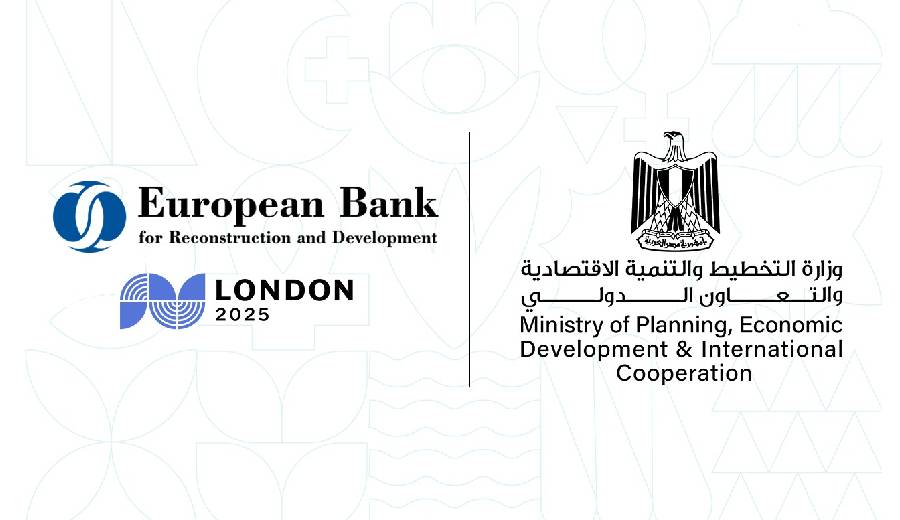The European Bank for Reconstruction and Development (EBRD) Released Regional Economic Prospects Report and Expects Continued Positive Growth for the Egyptian Economy, Supported by Strong Non-Oil Sector Activity and Structural Reforms

15 May 2025
During the Annual Meetings of the Bank Held in the United Kingdom
The European Bank for Reconstruction and Development (EBRD) Released Regional Economic Prospects Report and Expects Continued Positive Growth for the Egyptian Economy, Supported by Strong Non-Oil Sector Activity and Structural Reforms
EBRD expects Egypt's economy to grow to 3.8% by the end of June and 4.4% in FY 2025/2026.
Al-Mashat: Positive economic growth forecasts reflect the effectiveness of the economic and structural reform measures implemented by the state.
Encouraging industry and exports and improving the business environment are top priorities to achieve sustainable economic growth led by the private sector.
In continuation of the positive forecasts for the
Egyptian economy in reports issued by international institutions, the European
Bank for Reconstruction and Development (EBRD) released a report on “Regional
Economic Prospects,” coinciding with the Bank’s annual meetings held in the
United Kingdom, in which H.E. Dr. Rania Al-Mashat, Minister of Planning,
Economic Development, and International Cooperation and Egypt’s Governor at the
EBRD, is participating.
According to the EBRD's report, output growth is expected
to increase from 2.4% in FY 2024 to 3.8% in FY 2025 and 4.4% in FY 2026 on a
fiscal year basis. On a calendar year basis, the Bank expects growth to reach
4% in 2025 and 4.5% in 2026. Growth rose to 3.9% on year in the first half of
FY 2025 (July–December 2024), compared to 2.4% in the same period of the
preceding year, driven by the expansion in manufacturing, transportation, and
wholesale and retail trade sectors.
The EBRD report pointed to a recovery in the
manufacturing sector following a strong contraction during the time of foreign
exchange shortages prior to March 2024, in contrast to a decline in output in
the oil and gas sector, which the government is seeking to address by setteling
of arrears to international energy companies.
The report emphasized that growth outlook depends on the
implementation of structural reforms, particularly related to the state’s presence
in the economy, in addition to continued reduction of debt levels and
associated service costs, noting the risks surrounding the economy are
relatively high given international trade policies uncertainty.
H.E. Dr. Rania Al-Mashat, Minister of Planning, Economic
Development, and International Cooperation and Egypt’s Governor at the EBRD,
commented on the report, stating: “The positive growth forecasts for the
Egyptian economy reflect the effectiveness of the economic reform policies,”
noting that despite global economic challenges, Egypt’s economic performance
indicators showed a remarkable improvement in economic growth during the first
and second quarters of the current fiscal year, rising from 3.5% to 4.3%, with
growth expected to continue in the third and fourth quarters to record 4%
growth rate by the end of the year.
H.E. pointed out that to maintain this growth momentum,
the government continues to enhance macroeconomic stability policies and fiscal
consolidation, as well as proceeding with the implementation of the National
Structural Reform Program, which supports sustainable growth and improves the
business environment and investment climate to enable greater private sector
participation, adding that the state’s main objective is to achieve private
sector-led economic growth, based on tradable and exportable sectors.
The report addressed inflation rates, which declined to
12.8% in February 2025, its lowest level since March 2022, and is expected to
continue falling reflecting the Central Bank’s tight monetary policy stance.
However, rise fuel prices, as part of the government’s commitment to reach cost
recovery by the end of the year under the IMF-supported program, may put
upwards pressures on inflation. Net international reserves rose to US$ 47.4
billion in February 2025, their highest level in over 20 years, and are
expected to remain stable.
The EBRD report is consistent with the World Bank's
forecasts during the Spring Meetings, which predicted economic growth to rise
to 3.8% in the current fiscal year and 4.2% in the next fiscal year. The
International Monetary Fund (IMF) forecasted that Egypt’s economy will grow by
3.8% in the current fiscal year and 4.3% in the next, with GDP growth expected
to rise to 3.8% in FY 2025 and 4.2% in FY 2026, primarily driven by private
consumption, declining inflation, and a relative improvement in investor
confidence.
H.E. Dr. Rania Al-Mashat added that the expectations of
the two largest financial institutions the World Bank and the IMF, followed by
the EBRD’s report, for higher growth in Egypt’s economy this fiscal year and
the next, reflecting the tangible outcomes of the structural reforms
implemented by the state, which focus on improving the investment environment,
supporting the private sector, and enhancing economic resilience against
shocks, noting that the government aims to achieve comprehensive and
sustainable economic growth that contributes to creating real job opportunities
and improving living standards, which requires continuing and expanding the
scope of the reforms.
H.E. also emphasized the state’s strategic shift toward
economic growth based on tradeable and exportable sectors, through stimulating
investment, localizing industry, and the integrated measures the government is
implementing in terms of simplifying investment procedures and reducing customs
clearance time.









